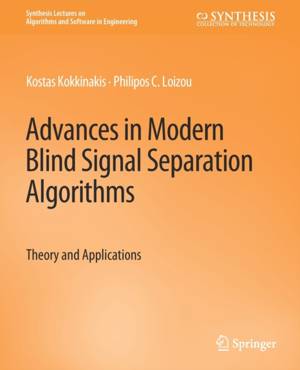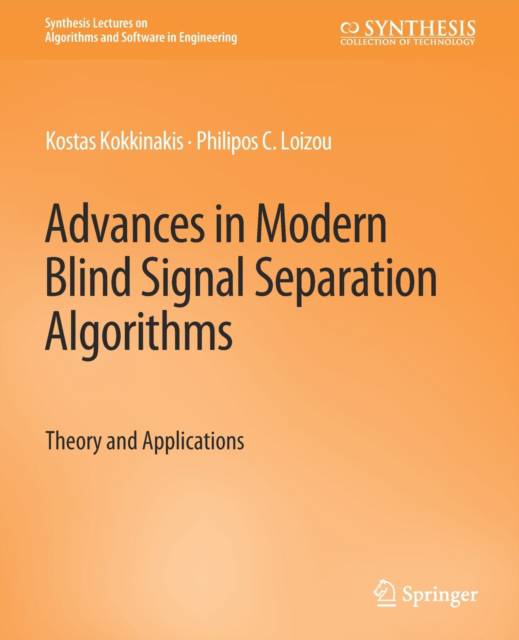
Door een staking bij bpost kan je online bestelling op dit moment iets langer onderweg zijn dan voorzien. Dringend iets nodig? Onze winkels ontvangen jou met open armen!
- Afhalen na 1 uur in een winkel met voorraad
- Gratis thuislevering in België vanaf € 30
- Ruim aanbod met 7 miljoen producten
Door een staking bij bpost kan je online bestelling op dit moment iets langer onderweg zijn dan voorzien. Dringend iets nodig? Onze winkels ontvangen jou met open armen!
- Afhalen na 1 uur in een winkel met voorraad
- Gratis thuislevering in België vanaf € 30
- Ruim aanbod met 7 miljoen producten
Zoeken
Advances in Modern Blind Signal Separation Algorithms
Theory and Applications
Kostas Kokkinakis, Philipos Loizou
€ 34,95
+ 69 punten
Omschrijving
With human-computer interactions and hands-free communications becoming overwhelmingly important in the new millennium, recent research efforts have been increasingly focusing on state-of-the-art multi-microphone signal processing solutions to improve speech intelligibility in adverse environments. One such prominent statistical signal processing technique is blind signal separation (BSS). BSS was first introduced in the early 1990s and quickly emerged as an area of intense research activity showing huge potential in numerous applications. BSS comprises the task of 'blindly' recovering a set of unknown signals, the so-called sources from their observed mixtures, based on very little to almost no prior knowledge about the source characteristics or the mixing structure. The goal of BSS is to process multi-sensory observations of an inaccessible set of signals in a manner that reveals their individual (and original) form, by exploiting the spatial and temporal diversity, readily accessible through a multi-microphone configuration. Proceeding blindly exhibits a number of advantages, since assumptions about the room configuration and the source-to-sensor geometry can be relaxed without affecting overall efficiency. This booklet investigates one of the most commercially attractive applications of BSS, which is the simultaneous recovery of signals inside a reverberant (naturally echoing) environment, using two (or more) microphones. In this paradigm, each microphone captures not only the direct contributions from each source, but also several reflected copies of the original signals at different propagation delays. These recordings are referred to as the convolutive mixtures of the original sources. The goal of this booklet in the lecture series is to provide insight on recent advances in algorithms, which are ideally suited for blind signal separation of convolutive speech mixtures. More importantly, specific emphasis is given in practical applications of the developed BSS algorithms associated with real-life scenarios. The developed algorithms are put in the context of modern DSP devices, such as hearing aids and cochlear implants, where design requirements dictate low power consumption and call for portability and compact size. Along these lines, this booklet focuses on modern BSS algorithms which address (1) the limited amount of processing power and (2) the small number of microphones available to the end-user. Table of Contents: Fundamentals of blind signal separation / Modern blind signal separation algorithms / Application of blind signal processing strategies to noise reduction for the hearing-impaired / Conclusions and future challenges / Bibliography
Specificaties
Betrokkenen
- Auteur(s):
- Uitgeverij:
Inhoud
- Aantal bladzijden:
- 88
- Taal:
- Engels
- Reeks:
Eigenschappen
- Productcode (EAN):
- 9783031003844
- Verschijningsdatum:
- 20/02/2010
- Uitvoering:
- Paperback
- Formaat:
- Trade paperback (VS)
- Afmetingen:
- 190 mm x 235 mm
- Gewicht:
- 195 g

Alleen bij Standaard Boekhandel
+ 69 punten op je klantenkaart van Standaard Boekhandel
Beoordelingen
We publiceren alleen reviews die voldoen aan de voorwaarden voor reviews. Bekijk onze voorwaarden voor reviews.











